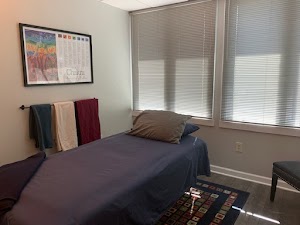We all experience our own version of pain & discomfort. Pain comes in many different forms, whether it is physical or emotional. I always add the word discomfort when talking about pain, because a lot of what we experience isn’t what we would consider “real” pain. It can be lots of things; an ache, soreness, stiffness, tenderness, swelling, tingling, numbness. It can be constant or occasional, mild or severe, a physical irritation or emotional distress such as grief, anxiety or depression. Pain can be your body’s way of warning you that something is wrong.
Living with any type of pain can be hard. It can cause many other problems. For instance, pain can:
■ Get in the way of your daily activities
■ Make it difficult to continue working
■ Affect your mood & emotional state
■ Disturb your sleep and eating habits
■ Be related to depression or anxiety
■ Keep you from spending time with loved ones
Acute & Chronic Pain:
There are two kinds of pain. Acute pain begins suddenly, lasts for a short time, and goes away as your body heals. You might feel acute pain after surgery or if you have an injury. Chronic pain lasts for 3 months or longer. Although this type of pain often affects older people, many younger people are affected by chronic pain as well. Chronic pain influences the mental state and can be a cause of depression.
Describing Your Pain:
It is often difficult to describe pain sensations. When asked to explain how you are experiencing your pain some details to think about when communicating how the pain feels are:
Intensity: Mild, Moderate, Severe
Quality: Sharp, Throbbing, Shooting, Burning, Dull, Achy, Tingling, Numb, Heavy
Regularity: Occasional, Frequent, Intermittent (comes & goes), Constant
Other factors to consider are: When did it start? Where does it hurt? What makes it worse or better? Is it affected by temperature or weather? Is it worse at a particular time of day?
It is important to address chronic pain. There are self-care practices & complimentary treatments we can use as an alternative to pain medication. Any treatment plan should focus on both reducing pain and increasing ways to support daily function while living with pain.
Natural and holistic ways of reducing & managing our aches and pains:
■ Exercise/Movement
■ Stretching
■ Massage/Bodywork
■ Diet/Nutrition
■ Meditation/Stress Reduction
■ Acupuncture
■ Chiropractic
■ Physical Therapy
■ Natropathy
■ Homeopathy
■ Diet/Nutrition
■ Counseling
■ Breathwork
■ Aromatherapy
■ Energy Medicine
Acupuncture & Pain
Acupuncture is a safe, natural and effective intervention for pain relief of the physical or psychological nature. Through the nervous, circulatory, endocrine & immune systems, acupuncture has influence on all of the body’s organ systems, processes and functions . Acupuncture motivates the healing response by stimulating the release of neurochemicals, hormones and peptides that are produced by the brain, nervous system & endocrine glands. These substances have a therapeutic and restorative effect on the body’s functions and processes, promoting balance and ultimately effecting change in the physical & emotional symptoms we experience.
Reducing Physical Pain & Discomfort:
Acupuncture has the effect of reducing pain & discomfort by stimulating the release of our body’s own natural pain killers called Opioid peptides. It promotes blood flow which circulates biochemicals, oxygen & nutrients for quicker healing. It stimulates the release of anti-inflammatory agents like dopamine & adenosine to help reduce inflammation. Dopamine has a systemic anti-inflammatory effect and adenosine has a local anesthetic effect that has been shown to help cartilage repair and slow the progression of arthritis. Placing an acupuncture needle into an acu-point triggers the local nerves to fire and signal the body to release a wide variety of our naturally occurring biochemicals,. These include red & white blood cells, histamines & other complex substances that provide feedback to the brain, promoting local & distal healing. Acupuncture can improve nerve signal processing in the central nervous system and has been shown to have a beneficial effect on neuromuscular conditions such as paralysis or spasticity.
Regulating Emotional Health:
Acupuncture alters the brain’s mood chemistry by regulating hormones & neurotransmitter levels. These biochemicals have the effect of reducing anxiety, worry, frustration, anger, grief & fear. These substances such as serotonin, noradrenaline, norepinephrine, dopamine, GABA, Neuropeptide Y & ACTH all have an effect on our mood & emotional health and can combat the negative effects of stress. Acupuncture acts on areas of the brain known to reduce sensitivity to pain and stress, as well as promote relaxation. It has been suggested that acupuncture increases the therapeutic efficacy of anti-depressants and was proven to be a safe add-on treatment to depression. (“The Benefit of Combined Acupuncture and Antidepressant Medication for Depression: A Systematic Review and Meta-Analysis”, J Affect Disord. 2015; 176:106-117).
Moderate the Stress Response:
Acupuncture moderates the stress response by stimulating the Parasympathetic nervous system- (Rest/Digest/Repair response). This action counteracts the Sympathetic Nervous system- (Fight/Flight/Freeze response) and reduces the stress hormones like cortisol and adrenaline. Stress affects our immune system by stimulating the increased production of cortisol. Cortisol acts as an immuno-suppressant. It reduces the number of white blood cells in our body, (specifically T cells and macrophages). White bloods cells are the foundation of our immune system and are the cells responsible for producing antibodies and destroying viruses, bacteria and tumor cells. The activation of the Parasympathetic NS initiates the relaxation response. Restoring the body to a state of calm allows for maintenance and repair to occur.
Our body/mind has an incredible healing capacity and ability to maintain physical and emotional balance. We can encourage these innate abilities through self-care practices such as regular movement & exercise, increased meditation or calming practices & maintaining a beneficial diet. Incorporating therapeutic methods such as massage & acupuncture into our self-care routine will support physical & emotional balance, reduce pain & discomfort and regulate the stress response. Here are some common benefits of acupuncture.
Acupuncture Benefits
■ Improved Chronic Stress Response
■ Decreased Anxiety & Depression
■ Enhanced Mental Clarity, Memory & Focus
■ Heightened Physical & Mental Energy
■ Reduced/Alleviated Pain Symptoms
■ Improved Sleep & Relaxation
■ Increased Motivation/Inspiration
■ Enhanced Digestion, Metabolism & Elimination



 My path to oriental medicine came through my experience with massage & bodywork. For over 20 years I have been studying and practicing massage therapy, but it was when I discovered Shiatsu (acupressure), that I realized there was something very powerful about Chinese Medicine…
My path to oriental medicine came through my experience with massage & bodywork. For over 20 years I have been studying and practicing massage therapy, but it was when I discovered Shiatsu (acupressure), that I realized there was something very powerful about Chinese Medicine…